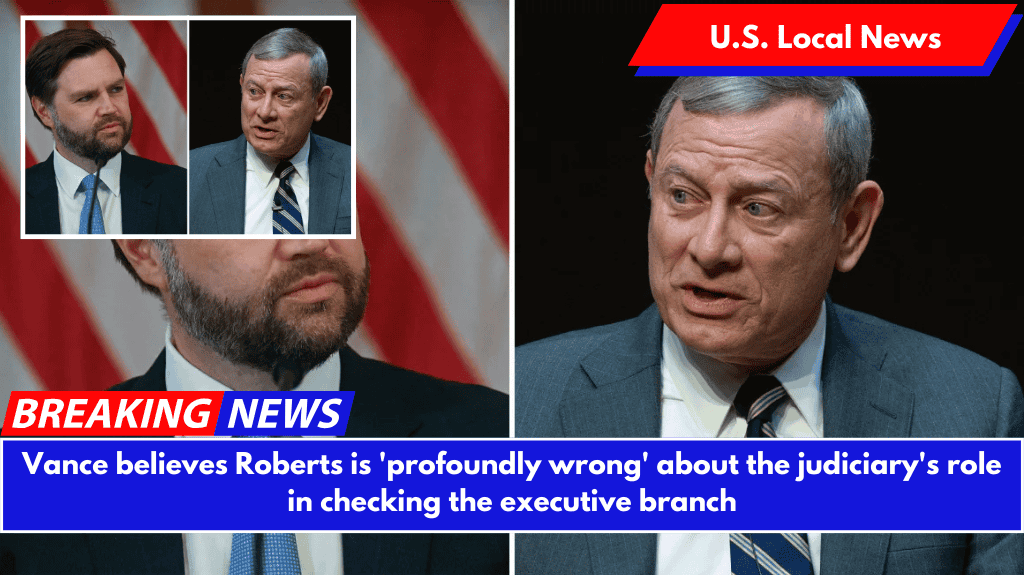Vice President JD Vance called Chief Justice John Roberts’ comments earlier this month that the judiciary’s role is to check the executive branch “profoundly wrong sentiment” and said the courts should be “deferential” to the president, particularly on immigration.
“I thought that was a very wrong sentiment. That is one half of his job; the other half is to check his own branch’s excesses.
And you cannot have a country in which the American people continue to elect immigration enforcement while the courts tell them they are not allowed to have what they voted for,” Vance told New York Times opinion columnist Ross Douthat on the “Interesting Times” podcast, which aired Monday.
Vance was responding to Roberts’ remarks at an event in Buffalo, New York, during which the chief justice emphasized the importance of judicial independence. “The judiciary is a coequal branch of government, separate from the others with the authority to interpret the Constitution as law, and strike down, obviously, acts of Congress or acts of the president,” Roberts stated during the proceedings.
The judiciary’s role, Roberts added, is to “decide cases but, in the course of that, check the excesses of Congress or the executive, and that does require a degree of independence.”
Vance’s interview with The Times, which was taped in Rome after he attended Pope Leo XIV’s inaugural mass, also touched on the vice president’s Catholic faith and how it influences his role as a political leader.
While Vance believes the administration has “an obligation to treat people humanely,” he also believes it is “open question” how much due process is “due” to undocumented immigrants.
“I’ve obviously expressed public frustration on this, which is yes, illegal immigrants, by virtue of being in the United States, are entitled to some due process,” according to Vance. “But the amount of process that is due and how you enforce those legislative standards and how you actually bring them to bear is, I think, very much an open question.”
On Friday, the Supreme Court blocked President Donald Trump’s attempt to deport a group of immigrants in northern Texas under the 1798 Alien Enemies Act, a victory for Venezuelans who feared they would be removed under the wartime authority. The administration used the powers earlier this year to expedite deportations of alleged gang members, citing national security concerns.
When asked about the justification for using legal authorities to deport people, Vance admitted that “we don’t have 5 million uniform combatants.” However, he cited thousands of migrants who, he claimed without evidence, “intentionally came to the United States to cause violence” to argue that courts should defer to the president on what he called a “public safety” matter.
“I believe that the courts should be somewhat deferential. In fact, I believe the design is for them to be extremely deferential to the questions of political judgment made by the people’s elected president of the United States,” Vance said. “People under appreciate the level of public safety stress that we’re under when the president talks about how bad crime is.”
When asked how he would define success in immigration after Trump’s presidency, Vance also cited the courts.
“Success, to me, is not so much a number, though, obviously I’d love to see the gross majority of the illegal immigrants who came in under Biden deported,” Vance told the crowd. “Success, to me, is that we have established a set of rules and principles that the courts are comfortable with and that we have the infrastructure to do that, allows us to deport large numbers of illegal aliens when large numbers of illegal aliens come into the country.”
Vance acknowledged that he has had to reconcile his faith with the administration’s policy decisions while also defending its immigration policies.
“I understand your point, and making these decisions, if you take our faith’s teachings seriously, are difficult. I’m not going to pretend that I haven’t struggled with some of this, that I haven’t questioned whether we’re doing the right thing,” Vance told Douthat.
“The concern that you raise is fair, there has to be some way in which you’re asking yourself as you go about enforcing the law – even, to your point, against a very dangerous people – that you’re enforcing the law consistent with, you know, the Catholic Church’s moral dictates and so forth.”
Douthat added, “And American law and basic principles.”
“Most importantly, American law,” Vance explained.
When asked about his disagreements on immigration with Popes Francis and Leo, Vance, who was wearing a tie Francis gave him before his death, said you have to “hold two ideas in your head at the same time” about enforcing border laws and respecting migrants’ dignity.
“I’m not claiming I’m always perfect at it. But I try to remember that we have obligations to people who are fleeing violence or, at the very least, poverty. I also believe I have a sacred obligation to enforce the law and promote the common good of my own country, which is defined as the people who have a legal right to be here,” Vance said.
“I really do think that social solidarity is destroyed when you have too much migration too quickly,” according to him. “So it’s not because I dislike migrants or am motivated by resentment. That is because I am attempting to preserve something in my own country, where we are a unified people.”











